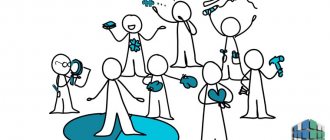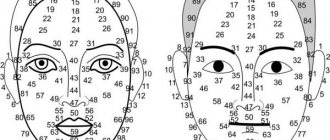Good afternoon or evening, dear readers. Each of us has an individual character, and of course, there are no people of the same type in the world. Scientists have long proven that even twins differ in character type, despite their similarity and upbringing using the same method.
Do you think that you have a good understanding of people and see right through them? Actually this is not true. What kind of character is a person? This can be judged only after a complete study of all types and highlighting the main parameters.
Method 1. What type of body type does the interlocutor have?
German psychologist E. Kretschmer believes that physique influences character traits. He identifies 3 main types of people.
"Picnic"
People with a full physique, according to the psychologist’s method, are called “picnics.” They are open in communication, are optimistic, and can show empathy. They love convenience and delicious food. They are emotionally unstable. If they are in a bad mood, they withdraw into themselves or may even become aggressive.
"Athletic"
People with a strong physique are classified into the “athletics” group. They are characterized by patience, calmness, self-confidence, and determination. Not sensitive to other people's experiences. Has a tendency towards aggression.
"Asthenik"
People with a thin physique are classified as “asthenics.” They are neat, attentive, and do any job well. But they can be irritable and distrustful. They need to feel safe.
Lowen topology
Psychology does not require precision, but by studying different people, over time you come to a positive or negative opinion. Do you think scientists invented all the indicators?
No, scientists, doctors and scientists have been studying human behavior for many decades. So the American psychoanalyst tried to create his own point of view, defining people by their behavior in certain circumstances.
Having studied the defensive reactions of individuals, he was able to recreate the complete picture by dividing humanity into 5 groups.
- Oral. Egoists and weak-willed individuals who cannot independently realize themselves in life without the support of other people. They constantly demand attention, care, and pity.
But at the same time they don’t give the other person anything in return. They cannot make decisions on their own, are afraid of loneliness, and are emotionally unstable in emergency situations.
- Masochistic. Angry and unbalanced people. They get along poorly in society because they constantly carry negativity. They love to feel sorry for themselves and complain about life, without trying to improve it. Seeing the tragedy of another person, he rejoices, because he believes that not only he has to suffer, let the other part of the planet suffer too.
- Hysterical. Reckless, emotional people who seek adventure in everything. They always play to the public, drawing attention to themselves.
They are in constant tension because they lie a lot and try to present themselves in the best light. Such subjects often experience emotional breakdowns, but do not like a calm, peaceful environment.
- Narcissistic. The name is chosen accurately, since the subjects love only themselves, forgetting about those around them and the problems that they themselves create.
Most often this applies to men. Women rarely suffer from this type of disorder. Narcissistic men persistently achieve their goals and have several partners at once, which allows them to assert themselves. They feel great in society, but suppress it for gain or to achieve a goal.
- Schizoid. Subjects are far from real life and cannot adequately respond to certain situations. Inconstancy in partnership, breakdowns, misunderstanding and self-criticism. A long-term relationship with one person forces you to be in constant tension and anxiety, which leads to scandals and breakups.
Method 11. Is it toxic?
You can even identify a toxic person by some of their remarks. He demonstrates jealousy, envy, complains about other people's successes and reduces the value of their merits, and blames others for his problems.
These tips will help you determine a person's character when you first meet. You can find out about the character of a new acquaintance without even contacting him directly, with the help of the Human Design System. This science tells how a person works, what traits are inherent in him at birth, how communicative he is, whether or not he is prone to conflicts, and whether he is ready to make concessions. An individual rave card gives a complete picture of the individual. Calculate it right now by filling out a special form. For a detailed transcript, order the PDF report.
features and differences
The definition of character is a set of persistent, relatively permanent psychological qualities that determine a person’s attitude to the world around him and his behavior. Experts identify several criteria by which temperaments are classified.
The connection between temperament and character
It should be noted that psychologists consider temperament and character as two complementary concepts. The formation of personality occurs under the influence of individual behavioral characteristics. It should be understood that characteristics and types of character are formed and manifested under the influence of temperament.
Difference of terms
It is necessary to understand the basic concepts, namely, temperament and character - what are the differences.
- Character is a person’s behavior in various situations. This is a combination of individual qualities that a person acquires throughout life. Personality characteristics are determined by the social environment in which personal qualities develop.
- Temperament is an emotional response to external stimuli. These are innate human properties, determined by the biological and mental characteristics of the individual.
It is important! Certain character traits are revealed depending on the social environment and environment where a person finds himself. Temperament does not change and remains constant regardless of the conditions and accompanying circumstances.
In psychology, it is customary to evaluate only the traits and types of individual qualities of a person. We can say that a person has a good, bad or strong character, but such assessments do not apply to temperament. Based on value judgments, the specialist identifies personal shortcomings and selects a strategy to eliminate them.
When accentuation becomes a pathology
On the one hand, an accentuated character trait can make a person successful, but on the other hand, it is his weak spot. Thus, people of the hysterical type can become talented actors. However, they are very afraid of ridicule and, in a negative situation, are prone to demonstrative suicide.
Therefore, there is always a high risk that in difficult situations, accentuation will develop into neurosis or psychopathy and become the cause of alcoholism, drug addiction, and crime. The reasons for the manifestation of character accentuation can be both hereditary factors and the characteristics of the child’s upbringing.
Positive human qualities
“The simple fabric of my destiny is embroidered with silks.” Silk threads here are character traits that make a person happy.
- Unselfishness
- Friendliness
- Discretion
- Confidence
- Determination
- Perseverance
- Sincerity
- Optimism
- Respect for others
- Moral
- Honesty
- Responsibility
- Accuracy
- Determination
- Hard work
Leonhard. Classification
Emotive type - communicate only with those people who understand you
Scientists have identified various types that describe character.
- Hyperthymic. Increased contact, talkativeness, pronounced facial expressions. Belongs to energetic optimists. There are disadvantages, namely frivolity in relationships, responsibilities, and frivolity.
- Disthymic. Characterized by low contact, a person of few words, a pessimist. The owner of such a disposition is accustomed to obey. The disadvantages are slowness. The advantages are conscientiousness, a serious sense of justice.
- Excitable. Characterized by low contact, there is boringness.
- Cycloid. Mood swings are typical. A person who is either overly sociable or withdrawn.
- Stuck. Moderate sociability, boring. People are touchy, conflict-ridden, and highly sensitive to injustice. Such persons want to achieve high results, in any field.
- Pedantic. Excessive zeal in service, constant tediousness, seriousness, conscientiousness.
- Emotive. The desire to communicate only with those people who understand him well. Overly sensitive people, touchy, whiny, are in a depressed mood. Pros include being compassionate as well as being diligent.
- Anxious. Low contact, indecisiveness. Such people very rarely enter into conflict. They are friendly, efficient and self-critical.
- Demonstrative. Such special ones strive to be in first place, crave power, are very sociable, and easily adapt when communicating with new people. However, hypocritical people are often selfish. The advantages include extraordinary thinking and artistry.
- Exalted. Increased desire to talk, falling in love. They can also be quite conflicting. They are attentive to close people and have sincere feelings. The disadvantages include alarmism and desperation.
- Introverted. Low level of contact, characterized by isolation from the real world and isolation. Such people are prone to loneliness, introspection, and are principled.
- Extroverted. Open to new information, they will always listen and help. They are very efficient and talkative. The disadvantages include rashness of actions, frivolity, and a tendency to gossip.
The theory of Carl Gustav Jung
This famous Swiss psychologist and psychiatrist created, at first glance, a rather simple classification of characters, but at the same time quite deep.
The theory of C. G. Jung examines the interaction of the conscious and unconscious. The scientist identified the following types of people according to psychology and character:
Read also: Named the most tasteless dishes in the world
- Extroverts. The activities and reactions of these people largely depend on the outside world, on the people and events around them. Extroverts are pleasant and sociable conversationalists, cheerful and open, with a lot of friends. They try to take everything from life, while caring little about their own health.
- Introverts. People with this type of character are more guided by their own feelings and experiences. It is quite difficult for others to understand them. Introverts are constantly uncommunicative and withdrawn, suspicious, characterized by a desire to analyze everything, and have very few friends.
- Ambiverts. In psychology, the character and personality of a person belonging to this type is considered as a combination of the previous two. Moreover, ambiverts borrowed all the good things from extroverts and introverts. Such people are excellent analysts. They have a subtle soul and are periodically prone to the desire to be alone. At the same time, ambiverts have such charisma, humor and wit that they can easily become the soul of a large company.
How is character revealed?
Since character is a combination of a large number of relatively constant properties of the psyche, its manifestations are present in every action in all spheres of life. These manifestations, as a rule, are represented by extreme degrees of certain forms of behavior. Let us consider the manifestations of character in different areas in more detail.
In relation to yourself it could be:
- modesty and arrogance;
- shyness and vanity;
- self-criticism and self-confidence.
In relation to others:
- isolation and sociability;
- the desire to dominate and the desire to be part of a team;
- trust and distrust;
- hostility and friendliness.
In relation to work:
- hard work and laziness;
- responsibility and irresponsibility;
- good faith and bad faith.
In relation to material assets:
- generosity and greed;
- thrift and extravagance;
- neatness and sloppiness.
The ancient Greek philosopher Heraclitus once said, “Character determines destiny.” And this is really so, because it manifests itself in every everyday little thing, in every serious or small decision and in every phrase spoken to a close or not so close person.
Personality formation - advice for parents
Many people are interested in the question of whether character changes. Indeed, personal qualities are formed and change throughout life. The process begins in early childhood. The first individual traits of a child appear already in preschool age; parents can identify a certain way of behavior and attitude towards the world.
If you want to raise your child with a strong personality, to develop perseverance, courage and endurance in your child, involve him in group games with a certain plot and rules.
How to build character and teach a child to work and responsibility? From childhood, assign simple tasks to your child, gradually complicating them. Thus, the child develops discipline, self-control, behavior is determined, and the baby learns to evaluate his actions and decisions. Thus, self-education occurs.
A new stage in personality formation begins when a child enters school, when his ability to communicate with classmates and perform new responsibilities is demonstrated. As a result of a change in environment and lifestyle, the child develops organization, accuracy, and hard work.
It is important! In childhood, the personality of the baby is influenced by the character of the parents and their habits. At school, the main role in character development is played by the school community - classmates, teachers.
A child’s character is revealed through the following areas during school:
- organization and systematicity;
- determination and perseverance;
- accuracy and hard work;
- discipline;
- consciousness of duty and responsibility to the school community;
- collectivism and camaraderie.
In adolescence, personal characteristics develop most actively, because at this age the child is attracted to adult life, and higher demands are placed on him. Feelings such as duty, responsibility, participation in the collective life of the class manifest themselves more consciously.
It is possible to change a child's character. Psychologists note that there are no children whose personal characteristics could not be re-educated. However, the process requires the participation of a specialist who can identify character flaws and select the most effective strategy for further action.











